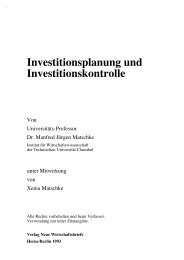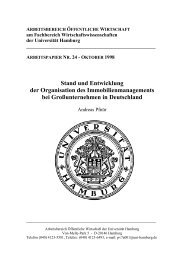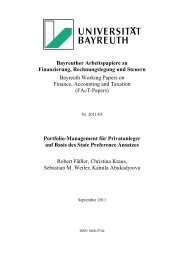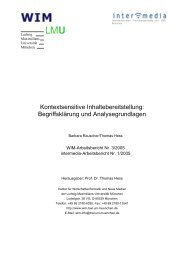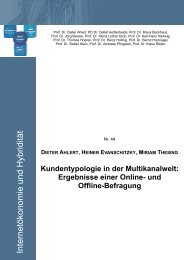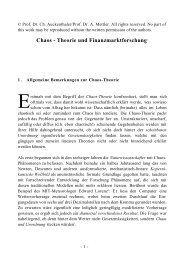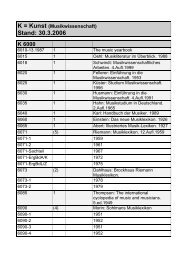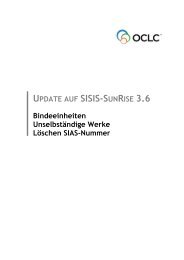FRANCE The
FRANCE The
FRANCE The
Create successful ePaper yourself
Turn your PDF publications into a flip-book with our unique Google optimized e-Paper software.
BELGIUM<br />
<strong>The</strong> Occupational Immersion<br />
Convention<br />
It is the aim of the Occupational Immersion Convention<br />
[Convention d’immersion professionnelle], by laying down a<br />
minimal set of working conditions, to provide a legal framework for<br />
those forms of placement within companies which do not conform<br />
to any existing legal arrangements, and also to create a broader legal<br />
framework for existing placements.<br />
<strong>The</strong> term “occupational immersion” covers all placement practices<br />
which have arisen spontaneously, and not corresponding to any<br />
existing legal framework. Defined negatively, it relates to everything<br />
that does not correspond to adequately regulated training at the<br />
federal, regional, community or even sectoral level. Targeted by this<br />
provision is every situation in which a person, as part of their<br />
functions, acquires certain knowledge or skills with an employer,<br />
while performing work for that employer. Some forms of training<br />
are exempted from this arrangement, such as work done by a school<br />
or university student for an employer as part of the training he/she<br />
is undertaking within an educational establishment or training<br />
organisation, provided that the total duration of that work does not<br />
exceed 60 days; placements where the duration is explicitly fixed by<br />
the competent authority within the framework of a course of study<br />
leading to the awarding of a diploma; or placements preparing the<br />
student to enter one of the professions or to provide an intellectual<br />
service.<br />
<strong>The</strong> agreement is formulated in a written statement for each trainee<br />
individually, to be made, at the latest, at the point when the trainee<br />
begins to implement the agreement.<br />
<strong>The</strong> provisions of the Occupational Immersion Convention also<br />
include the payment of an allowance. <strong>The</strong> amount of this shall not<br />
be less than the allowance paid in the case of industrial<br />
apprenticeships (from 372.20 euro per month for an apprentice aged<br />
15 to 581.60 euro for an apprentice aged 21 or over).<br />
While primarily undertaking to provide a minimum legal<br />
framework for forms of placement that have arisen spontaneously,<br />
it is also the aim of the convention to establish minimum legal<br />
protection for all currently existing forms of in-company training,<br />
without infringing the competences of the federal authorities. <strong>The</strong><br />
provisions of this second strand will not be applicable until<br />
1 September 2004, in order to allow time for the Communities and<br />
Regions to adopt the requisite measures.<br />
<strong>The</strong> schemes established by, or as a result of, decrees, ordinances or<br />
(sub-) sectoral collective labour agreements will have to meet<br />
minimum requirements in terms of documentation and payment. In<br />
terms of documentation, the schemes will have at least to state the<br />
principle behind the placement, its duration, the procedures for<br />
terminating the contract and the arrangements by which the<br />
allowance will be paid. For apprentices of at least 18 years of age<br />
who have completed their third year of training, the allowance may<br />
not be less than one-third of the average monthly minimum wage.<br />
This amount may be made up in part from social benefit payments.<br />
UNITED KINGDOM<br />
Work-focused Interviews<br />
Placement & Vocational Guidance<br />
Jobcentre Plus introduced a new single gateway to the benefit<br />
system for all people of working age with a clear focus on work as<br />
well as ensuring greater help for those who are unable to work.<br />
<strong>The</strong> Work-focused Entry to the Benefit System is a service which<br />
addresses the possibility of work as a means of support regardless<br />
of the client group or benefit claimed. It embodies the principle of<br />
“work for those who can and security for those who cannot”. It<br />
promotes the benefits of work to all customers and does not confine<br />
discussions about work to people claiming Jobseeker’s Allowance<br />
(JSA). It is an inclusive, rather than exclusive, service and does not<br />
pre-judge customers on the basis of benefits claimed.<br />
Jobcentre Plus implements the JSA regime for unemployed<br />
customers, and delivers work-focused interviews at the start of a<br />
benefit claim and periodically thereafter for other customers. It<br />
provides ongoing help towards work for customers such as lone<br />
parents, carers and people with disabilities. It recognises that paid<br />
work,for both individuals and families, is the most secure means of<br />
averting poverty and dependence.<br />
In delivering this work-focused service, Jobcentre Plus is helping to<br />
forge an entirely new culture designed to help people to help<br />
themselves.<br />
Who gets a Work-focused Interview?<br />
In Jobcentre Plus offices, everyone making a claim for one of the<br />
benefits listed below should receive a Work-focused Interview<br />
(WFI), carried out by a Personal Adviser, unless the requirement is<br />
waived.<br />
• Income Support<br />
• Incapacity Benefit<br />
• Severe Disablement Allowance<br />
• Bereavement Benefit<br />
• Invalid Care Allowance<br />
Purpose of the Work-focused Interview<br />
<strong>The</strong> WFI was introduced so that all customers of working age<br />
benefits would have a responsibility to consider work as an option<br />
before proceeding with their claims. <strong>The</strong> WFI is designed to<br />
encourage non-Jobseekers into work if they are ready, or into a<br />
voluntary New Deal or other provision to help them prepare for<br />
work. Personal Advisers are trained to help the customer identify<br />
their skills and capabilities and to tackle any barriers there may be<br />
to moving towards work. <strong>The</strong> customer is encouraged to produce an<br />
action plan to help them move towards work, even if that is a longterm<br />
goal. Only the WFI itself is mandatory; any other action is<br />
undertaken by the customer on a voluntary basis.<br />
<strong>The</strong> WFI is not intended to be a punitive measure or a<br />
discouragement to claiming benefit. It is a mechanism to help<br />
people who might otherwise not have done so think about work<br />
options, and receive information about help available.<br />
For those who cannot consider work immediately, perhaps because<br />
they are too ill or have heavy caring responsibilities, the WFI is<br />
intended to be a link with the labour market and to help them plan<br />
for a return to work in the future.<br />
Spring 2003 | European Employment Observatory Review 27



